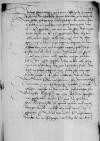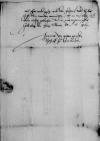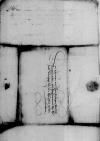Wir haben gestrigs tags E(wer) E(rbarkei)t ⌊⌋ / bei diesem boten erhalten, / aus welchem wir gerne vornommen, / das es E(wer) E(rbarkei)t gefallen, / wie wir von der hern ⌊rethe⌋ wegen / dieser lande an ⌊ko(niglich)e m(aieste)t⌋ ⌊⌋. / Den letztenn aber punct / dorin haben wir nach laut der ⌊hern⌋ stym / nicht anders mugen setzen. / Was wir in demselbten von ruhe und einigkeit wegen E(wer) E(rbarkei)t zugefallen / und der ⌊stadt⌋, unserm vaterlande, / zu gutt, / so vil uns zimen will, / werden mugen fordern, / sol an uns nichts abgehen. / Wir wolten aber gerne / umb vil bedenckens, / das wir derhalben haben, / das diese eingelegte abschrift eins zedels, / die wir vortrauter weise E(wer) E(rbarkei)t thun mitteilen, / der in des gros(mechti)g(en) und edlen, wolgebornen hern ⌊pommerellisch(en) woiwoden etc.⌋ und ⌊elbingisch(en) castellan etc.⌋ ⌊⌋ gelegen, / welcher an uns / und den hochwirdigen hern ⌊colmischen bischoff etc.⌋ den XXI Februarii vorschinnen geschrieben, / durch E(wer) E(rbarkei)t und die geladene hern burgermeister zu gemut gefurt und woll bewogen wurde, / welchs wir nicht umb sonst schreiben etc. Das uns auch E(wer) E(rbarkei)t nicht wenig dancken der trewhertzigen meinung, / die wir durch  APG 300, 53, 268, p. 134 schrift, / auch ire negste geschickte haben angezeigt, / ist unnottig, / dan wir wissen uns des E(wer) E(rbarkei)t und der guten ⌊stadt⌋, unserm vaterlandt, schuldig, / die wir gerne wolten, / neben E(wer) E(rbarkei)t, samptlich, / das sie in gnaden und gunst Gottes unnd unser irdischen obickeit teglich thetten zunehmen / und in wolfarendem fried vorblieben. / Was wir dorzu fortzustellen vormugen, / sein wir erbottigk und willigk etc. Der rede halben umb die fordrung der gemein, / das E(wer) E(rbarkei)t irem ⌊secretario⌋ an ko(nigliche)n hoff, / so solchs nottigk zuvor text damaged⌈[uvor]uvor text damaged⌉antworten und zuentschuldigen, / geschrieben, / sehen wir vor gut an und nutzlich. / Was weiter andere sachen angehet, / in welch(en) E(wer) E(rbarkei)t an ⌊ko(niglich)e m(aieste)t⌋, unsern allergnedigisten herren, / iren brieff neben der copei / haben uns geschickt, / wollen wir ein solchen durch eigenen boten mit den ersten, / dorbei auch unser vleissig schreiben und commendacion an hochgemelte ko(niglich)e m(aieste)t fertigen / in guter hofnung, / ersprislich werde sein, / das nach solchem gethanen bericht dergleichen mandat / niemandt so leichtlich fordtan werde ausbringen. / Worinne wir auch sonst, / wie uns E(wer) E(rbarkei)t allwegk befunden, / derselbten, / die wir gotlichen gnadenn bevelhen, /
APG 300, 53, 268, p. 134 schrift, / auch ire negste geschickte haben angezeigt, / ist unnottig, / dan wir wissen uns des E(wer) E(rbarkei)t und der guten ⌊stadt⌋, unserm vaterlandt, schuldig, / die wir gerne wolten, / neben E(wer) E(rbarkei)t, samptlich, / das sie in gnaden und gunst Gottes unnd unser irdischen obickeit teglich thetten zunehmen / und in wolfarendem fried vorblieben. / Was wir dorzu fortzustellen vormugen, / sein wir erbottigk und willigk etc. Der rede halben umb die fordrung der gemein, / das E(wer) E(rbarkei)t irem ⌊secretario⌋ an ko(nigliche)n hoff, / so solchs nottigk zuvor text damaged⌈[uvor]uvor text damaged⌉antworten und zuentschuldigen, / geschrieben, / sehen wir vor gut an und nutzlich. / Was weiter andere sachen angehet, / in welch(en) E(wer) E(rbarkei)t an ⌊ko(niglich)e m(aieste)t⌋, unsern allergnedigisten herren, / iren brieff neben der copei / haben uns geschickt, / wollen wir ein solchen durch eigenen boten mit den ersten, / dorbei auch unser vleissig schreiben und commendacion an hochgemelte ko(niglich)e m(aieste)t fertigen / in guter hofnung, / ersprislich werde sein, / das nach solchem gethanen bericht dergleichen mandat / niemandt so leichtlich fordtan werde ausbringen. / Worinne wir auch sonst, / wie uns E(wer) E(rbarkei)t allwegk befunden, / derselbten, / die wir gotlichen gnadenn bevelhen, /  APG 300, 53, 268, p. 135 vil ehre und nutz / und der guten ⌊stad⌋ bestes zufordern werden vormugen, / soll an unserm vleis nichts gebrechen. /
APG 300, 53, 268, p. 135 vil ehre und nutz / und der guten ⌊stad⌋ bestes zufordern werden vormugen, / soll an unserm vleis nichts gebrechen. /
 APG 300, 53, 268, p. 137
APG 300, 53, 268, p. 137
Diesen obgeschriebnen zedell hab wir erst den XI tag dis monats von dem hochwirdigen hern ⌊colmisch(en) bischoffe⌋ etc. uberkommen, / bey dem uns sein liebd geschrieben, / das nach ufbrechung des brieffs der zweier gemelter ⌊hern⌋, / welcher an uns beide gestalt war, / zu ⌊Dirschaw⌋ den XXI Februarii ausgangen. / Solchen zedell under andern widderumb in brieff zuthun sein lieb het vorgessen / were der uff das mall bei uns gewest do E(wer) E(rbarkei)t geschickten bei uns waren / solt in unvorhalten sein bliebenn etc.
 APG 300, 53, 268, p. 134 schrift, / auch ire negste geschickte haben angezeigt, / ist unnottig, / dan wir wissen uns des E(wer) E(rbarkei)t und der guten
APG 300, 53, 268, p. 134 schrift, / auch ire negste geschickte haben angezeigt, / ist unnottig, / dan wir wissen uns des E(wer) E(rbarkei)t und der guten  APG 300, 53, 268, p. 135 vil ehre und nutz / und der guten
APG 300, 53, 268, p. 135 vil ehre und nutz / und der guten 



